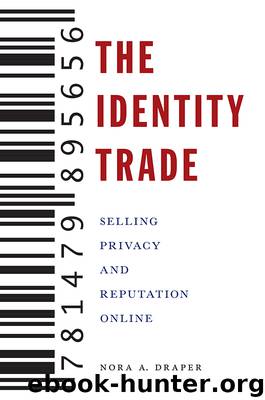The Identity Trade by Nora A. Draper

Author:Nora A. Draper
Language: eng
Format: epub
Tags: SOC052000 Social Science / Media Studies
Publisher: New York University Press
Personal Branding: Building the Brand Called You
In 1997, the business and innovation magazine Fast Company ran a cover story titled “A Brand Called You.” In the article, Tom Peters introduced personal branding as a strategy for standing out in “The Age of the Individual.” In an unpredictable labor market, fueled by rapid technological advances, he wrote, “we are CEOs of our own companies: Me Inc. To be in business today, our most important job is to be head marketer for the brand called You.”31 The need to think about oneself the same way a company thinks about its brand, Peters wrote, is inescapable. He urged readers to identify the characteristics and qualities they possess that add remarkable, measureable, and distinct value. But thinking about oneself as a brand, Peters warned, is only half the battle. We also have a responsibility to sell ourselves. Just like any major brand, Peters noted, the brand called You requires visibility to be successful. “When you’re promoting brand You,” he wrote, “everything you do—and everything you choose not to do—communicates the value and character of the brand.”32 Ending his article with a call to readers to get started building their own brand today (or else!), Peters’s description of self-branding suggested a form of reflexive self-presentation so deeply tied to promotional logics that the distinction between person and product disappeared.
The application of language common in advertising to individual self-presentation was relatively novel when it first appeared on the cover of Fast Company.33 The notion of packaging and selling oneself, however, has parallels in academic discussions of “enterprise culture” and the construction of the “entrepreneurial self.”34 In his book Consumption and Identity at Work, Paul du Gay defines an enterprise culture as “one in which certain enterprising qualities—such as self-reliance, personal responsibility, boldness and a willingness to take risks in the pursuit of goals—are regarded as human virtues and promoted as such.”35 The corresponding entrepreneurial self is a worker who, in the competitive and flexible work environment Peters described, views labor as a path toward self-improvement.36 Critical academics, including Hearn, argue that this slippage between the self as commodity worker and the actualized self described by du Gay, is the consequence of a neoliberal environment that prizes achievement through personal choice, initiative, and risk.37 For the entrepreneurial self, the ability to package strengths and promote achievements is not only an economic requirement but also the path to self-fulfillment.
In previous chapters, I describe the use of promotional language to emphasize the importance of privacy-enhancing technologies. To explain how the sale of personal information by individuals through data intermediaries could minimize inequalities in the emerging data economy, entrepreneurs in the 1990s were already using terms such as “personal datamart,” “meBay,” and “identity commerce.” By 2010, however, the application of promotional language to discussions about self-presentation and privacy protections had become commonplace. At this point, the commodification of self-reflection was big business for image consultants, and narratives of personal branding could be found in numerous books, workshops, and seminars.38 The
Download
This site does not store any files on its server. We only index and link to content provided by other sites. Please contact the content providers to delete copyright contents if any and email us, we'll remove relevant links or contents immediately.
Cecilia; Or, Memoirs of an Heiress — Volume 1 by Fanny Burney(31333)
Cecilia; Or, Memoirs of an Heiress — Volume 3 by Fanny Burney(30934)
Cecilia; Or, Memoirs of an Heiress — Volume 2 by Fanny Burney(30889)
The Great Music City by Andrea Baker(21323)
We're Going to Need More Wine by Gabrielle Union(18074)
Bombshells: Glamour Girls of a Lifetime by Sullivan Steve(13109)
Pimp by Iceberg Slim(12933)
All the Missing Girls by Megan Miranda(12753)
Fifty Shades Freed by E L James(12451)
Norse Mythology by Gaiman Neil(11885)
Talking to Strangers by Malcolm Gladwell(11880)
Crazy Rich Asians by Kevin Kwan(8351)
Mindhunter: Inside the FBI's Elite Serial Crime Unit by John E. Douglas & Mark Olshaker(7835)
The Lost Art of Listening by Michael P. Nichols(6474)
Enlightenment Now: The Case for Reason, Science, Humanism, and Progress by Steven Pinker(6407)
Bad Blood by John Carreyrou(5770)
The Four Agreements by Don Miguel Ruiz(5511)
Weapons of Math Destruction by Cathy O'Neil(5038)
We Need to Talk by Celeste Headlee(4871)
